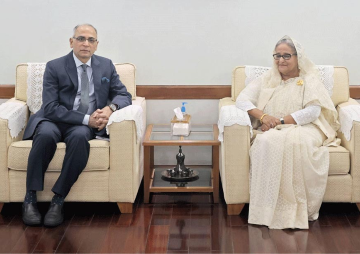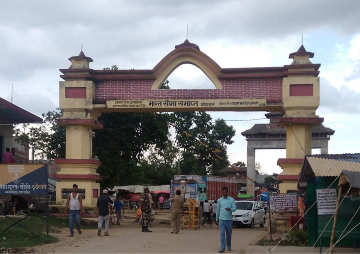The inauguration of the Integrated Check Post (ICP) at Attari on 13 April was important and interesting in many ways. After a long time, dignitaries from both Pakistan and India, including Mr. P Chidambaram, Indian Home Minister, Mr Anand Sharma and Mr. Makhdoom Ahmad Fahim, Commerce Ministers of India and Pakistan, and the Chief Ministers of both Punjabs, Mr. Parkash Singh Badal and Mr. Muhammad Shahbaz Sharif, were present on the same dais. That too on the Attari-Wagah border which has become famous only because of a jingoistic border retreat ceremony.
The setting up of the ICP at Attari is noteworthy for many reasons. It will naturally give a fillip to bilateral trade between the two countries and take them closer to the target of $10 billion.
Built at a cost of nearly Rs 150 crore and spread over about 130 acre, the ICP will consist of passenger and cargo terminals, security and scanning equipment. Besides this, it will also have passenger amenities such as waiting areas, restaurants, rest rooms, duty-free shops, banks and financial services, dormitories for drivers and all related facilities in a single compound. It can handle about 600 trucks at a time. Pakistan, on the other hand, has built its ICP over nine acres. Both the ICPs are connected through new gates built by India and Pakistan. As a consequence of this enhanced infrastructural capability, trade which was conducted only between 8 am and 4 pm can take place for 12 hours daily between 7 am and 7 pm as against the eight hours earlier. Thus more trucks can land in India and cross over to Pakistan on a daily basis.
The ICP is not a boon only for traders, but in fact it has also made life easier for tourists. The facility has arrival and departure jatha sheds for the comfort of religious tourists who earlier faced discomfort as they had no proper place to sit while completing customs and immigration formalities.
Apart from the bilateral context, the ICP is important and 12 more ICP’s are likely to be opened at other border points, improving connectivity with other countries in the neighbourhood, including Nepal, Myanmar and Bangladesh.
The ICP has immense relevance for Punjab in general and Amritsar in particular which was virtually a twin city with Lahore, but it suffered economically first as a consequence of the 1965 war and then due to the decade-long militancy. As a consequence of both these setbacks, Amritsar, once a trade hub of North India, was left behind, while Lahore being an important city of Pakistan, continued to grow.
The period between 2003-07, which was witness to some giant leaps in the peace process between the countries, was accompanied by greater interaction between Indian Punjab and Pakistani Punjab.
Apart from interactions at the official level, there were numerous cultural exchanges and greater interaction between businessmen from both the sides, with the Chambers of Lahore and Amritsar working quite closely.
The first consequence of this closeness and anticipation of trade activities was the sudden skyrocketing of land prices in both the border towns of Amritsar and Lahore.
As a consequence of the thaw between both the countries, bonhomie between the Punjabs and pressure of the business lobby on both sides, trade was opened up through the Attari-Wagah land route in October 2007.
This has persisted even during periods of intense political tensions between both the countries and trade actually increased even in the aftermath of Mumbai.
It is no surprise thus that Pakistan’s decision to grant MFN status to India which was welcomed by all sane Indians and the setting up of the ICP at Wagah, came as a much awaited boon for the businessmen of Amritsar who have been patiently waiting for this day.
Realising this, the political community, especially the ruling Shiromani Akali Dal missed no opportunity to take the credit for this development. On the eve of the inauguration, there were numerous advertisements in Punjab papers lauding the Punjab CM Parkash Singh Badal for his contribution to the setting up of the ICP. One Punjab minister linked this development to the 1999 Lahore bus initiative of Vajpayee, former Prime Minister.
Manmohan Singh’s steadfast commitment to engagement with Pakistan and former Punjab chief minister Captain Amarinder Singh’s overtures towards Pakistani Punjab were quite naturally obliterated.
Another consequence of this inauguration - along expected lines - has been the demand by political leadership across the board in the state to ask for opening up more land routes with Pakistan such as Sadki in Fazilka and Hussainiwala (both in the Malwa region of Punjab). Punjab Chief Minister Parkash Singh Badal reportedly took up the issue of opening the Hussainiwala border during his one on one meeting with his counterpart from the Pakistani side, who evinced interest. Even during the course of his speech at the function, Badal urged central ministers on both sides to seriously look into the issue.
It might be mentioned here that nearly 100 trucks carrying dry fruit and other fruits from Afghanistan and Pakistan used to pass through the Hussainiwala check post before the 1971 war. While Indian traders exported rice-shelling equipment and farm machinery to Pakistan and beyond. With the Bathinda Oil refinery likely to be operational soon, the Punjab Government is also seriously exploring the possibility of selling petro- chemicals via this route. Political parties are bound to spar over who deserves credit for the setting up of the ICP and this will continue when other trade routes open. This is an indirectly positive development as it shows that there is a genuine yearning for peace and closer economic ties with Pakistan. Perhaps, Mamata Banerjee would do well to learn a thing or two from Punjabi politicians as far as neighbourhood relations are concerned.
Amidst the euphoria however, there are certain issues which have dampened the spirits of Punjab’s traders. First, the Pakistan government has still not allowed trade of items freely from the Attari-Wagah land route despite it being the cheapest and shortest trade route. Only 137 items have been included in the list of items exported from Wagah. What has shocked the business community even more is that the list doesn’t comprise 137 different items, but it includes numerous categories of various items. These items include livestock (eight categories), carcasses/ meat (15 categories), vegetables (22 categories), raw jute (29 categories) and yarn (44 categories). These five items alone take the figure up to 118 in the list of 137 items. It might be mentioned that trade across the LOC has also failed to generate enthusiasm due to a restricted list of items for trade.
Second, there is a demand for integrating the railway line at Attari into the ICP. For achieving this it would be imperative to have a small extension of the 120-acre ICP onto the rail track. Unless the extension to cover the railway line is carried out, rail cargo, including perishables such as gypsum and cement, shall continue to remain stored in the open and lie for months due to the paucity of warehousing space.
Third, the Pakistan ICP is much smaller and lacks adequate facilities for substantial trade. This asymmetry needs to be reduced urgently, otherwise it could prove to be a major impediment to greater trade. Interestingly, the Pakistan Commerce Secretary stated that one of the main reasons for not broadening the list of items for trade was the poor infrastructure on the Pakistan side.
Unless these issues are not addressed properly, April 13 would be no more than another ’political mushaira’ which people on both countries are used to. And this would end up in reducing the ICP to a symbolic overture as cross LOC trade is.
(Tridivesh Singh Maini is an Associate Fellow at Observer Research Foundation)
Courtesy: tehelka.com
The views expressed above belong to the author(s). ORF research and analyses now available on Telegram! Click here to access our curated content — blogs, longforms and interviews.




 PREV
PREV

